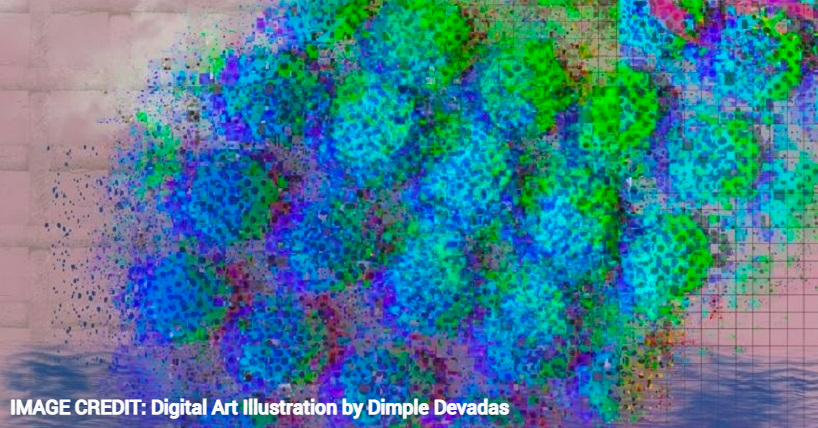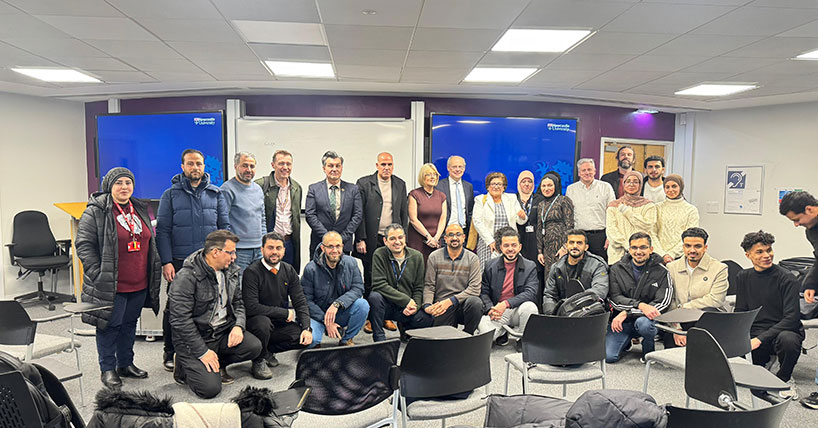Novel epigenetic mechanism for oncogene activation
Novel epigenetic mechanism for oncogene activation identified
Published on: 28 July 2022
New research describes how genetic changes contribute to the development of blood cancers.
The three papers, published in the latest edition of the journal Genome Research demonstrate how chemical marks and proteins within our DNA are hijacked by genes that contribute to the development of blood cancers. An image inspired by the research also features as the edition’s cover image.
This new research focuses on a specific chemical marker called H3K4 tri-methylation, or H3K4me3. It shows how this marker can be used by genes that contribute to the development of blood cancers, instructing the cells to grow more quickly rather than dying and enabling the cancer to develop.
Human DNA is like a recipe book that contains instructions and ingredients to produce all the cells that make up our body. Genes need instructions, known as ‘enhancers’ to know when they should be switched on and off in healthy cells. Large enhancers, called super-enhancers, can switch on genes that are important for determining what kinds of cells will develop. They do this by painting the genetic code with chemical marks or proteins that enable the genes to be reliably and consistently switched on (expressed).
The studies were co-authored by scientists from the Newcastle University Biosciences Institute and Centre for Cancer. They collaborated with French teams from Aix-Marseille University, Inserm the French National Institute of Health and Medical Research, Necker Hospita, as well as University of Arkansas for Medical Sciences, Indiana University and New York University in the USA, the Josep Carreras Foundation in Spain, the Babraham Institute and the University of Edinburgh.

Artist collaboration
The Newcastle scientists are collaborating with artist Dimple Devadas who has created a virtual exhibition, ‘Science as Genome art’. One of the images, shown above, is used as the cover for the latest edition of Genome Research where the papers are published. Dr Devadas trained in medicine and has worked across many different healthcare sectors. They describe themself as an experimental creative and use a range of media. Find out more on the Volve Health website.
Study details
Studies one and two, identified that H3K4me3 broad domains flag active oncogenes in lymphoid malignancies, when they are frequently dysregulated. The first work, led by teams at Aix-Marseille Inserm and Necker hospital shows that key oncogenes were generally associated with broad domains in T-Acute Lymphoblastic Leukaemia. Moreover, it demonstrated that the ectopic expression of oncogenic transcription factors preferentially impact the expression of broad domain-associated genes in pre-leukemic cells, suggesting an important role in cancer initiation. The study also shows therapeutic potential as the number of broad H3K4me3 domains in a given cell line was predictive of the sensitivity to an epigenetic drug targeting H3K4me3.
The second work, led by Newcastle researchers shows that H3K4me3 broad domains are associated with regulatory elements of cell identity genes, called super-enhancers, that are hijacked in cancer cells. Co-leads, Drs Daniel Rico and Lisa Russell explain, “It was known that the genomic translocation of super-enhancers could activate oncogenes, but we showed that this can be associated with the disappearance of H3K4me3 broad domains from cell identity genes, and their appearance over oncogenes as a direct result of super-enhancer hijacking”. First author, Dr Aneta Mikulasova adds, “We came up with a new concept: the epigenomic translocation of broad domains that follows the genomic translocation of super-enhancers“.
For study three the Newcastle team collaborated with colleagues at the University of Edinburgh to further understand how these epigenomic translocations occur after genomic rearrangements. They replicated the motion and interactions of the chromosomes before and after super-enhancer translocations which occur in cancer. Dr Russell notes the power of this approach for cancer research: “Not only do the simulations allow us to understand how the H3K4me3 domains translocate, but they suggest sites on the DNA which can then be targeted in experiments that aim to reverse the disease”.
Taken together, these works show that the regulation of broad H3K4me3 domains is associated with leukemogenesis and suggest that the presence of these structures might be used for epigenetic prioritisation of cancer-relevant genes.
References
1. Dynamics of broad H3K4me3 domains uncover an epigenetic switch between cell identity and cancer-related genes. Genome Research.
Mohamed Belhocine, Mathieu Simonin, José David Abad Flores, Agata Cieslak, Iris Manosalva, Lydie Pradel, Charlotte Smith, Eve-Lyne Mathieu, Guillaume Charbonnier, Joost H.A. Martens, Hendrik G. Stunnenberg, Muhammad Ahmad Maqbool, Aneta Mikulasova, Lisa J. Russell, Daniel Rico, Denis Puthier, Pierre Ferrier, Vahid Asnafi, and Salvatore Spicuglia
DOI: 10.1101/gr.266924.120
2. Epigenomic translocation of H3K4me3 broad domains following hijacking super-enhancers. Genome Research.
Aneta Mikulasova, Daniel Kent, Marco Trevisan-Herraz, Nefeli Karataraki, Kent T.M Fung, Cody Ashby, Agata Cieslak, Shmuel Yaccoby, Frits van Rhee, Maurizio Zangari, Sharmilan Thanendrarajan, Carolina Schinke, Gareth J Morgan, Vahid Asnafi, Salvatore Spicuglia, Chris A Brackley, Anne E Corcoran, Sophie Hambleton, Brian A Walker, Daniel Rico, and Lisa J Russell
DOI: 10.1101/gr.276042.121
3. High-resolution simulations of chromatin folding at genomic rearrangements in malignant B-cells provide mechanistic insights on proto-oncogene deregulation. Genome Research.
Rico D, Kent D, Mikulasova A, Karataraki N, Walker BA, Javierre BM, Russell LJ, Brackley CA.
DOI: 10.1101/2021.03.12.434963



